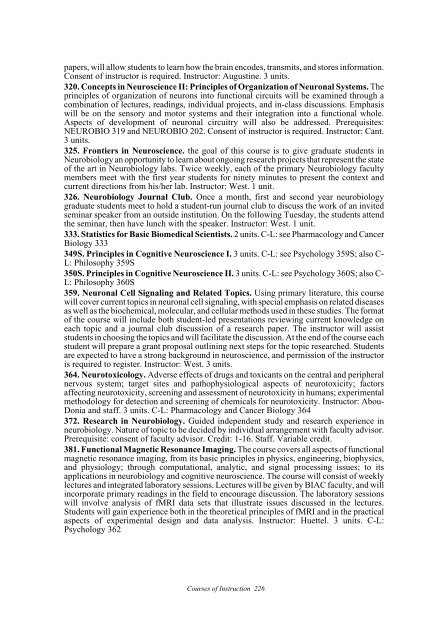Duke University 2008-2009 - Office of the Registrar - Duke University
Duke University 2008-2009 - Office of the Registrar - Duke University
Duke University 2008-2009 - Office of the Registrar - Duke University
Create successful ePaper yourself
Turn your PDF publications into a flip-book with our unique Google optimized e-Paper software.
papers, will allow students to learn how <strong>the</strong> brain encodes, transmits, and stores information.<br />
Consent <strong>of</strong> instructor is required. Instructor: Augustine. 3 units.<br />
320. Concepts in Neuroscience II: Principles <strong>of</strong> Organization <strong>of</strong> Neuronal Systems. The<br />
principles <strong>of</strong> organization <strong>of</strong> neurons into functional circuits will be examined through a<br />
combination <strong>of</strong> lectures, readings, individual projects, and in-class discussions. Emphasis<br />
will be on <strong>the</strong> sensory and motor systems and <strong>the</strong>ir integration into a functional whole.<br />
Aspects <strong>of</strong> development <strong>of</strong> neuronal circuitry will also be addressed. Prerequisites:<br />
NEUROBIO 319 and NEUROBIO 202. Consent <strong>of</strong> instructor is required. Instructor: Cant.<br />
3 units.<br />
325. Frontiers in Neuroscience. <strong>the</strong> goal <strong>of</strong> this course is to give graduate students in<br />
Neurobiology an opportunity to learn about ongoing research projects that represent <strong>the</strong> state<br />
<strong>of</strong> <strong>the</strong> art in Neurobiology labs. Twice weekly, each <strong>of</strong> <strong>the</strong> primary Neurobiology faculty<br />
members meet with <strong>the</strong> first year students for ninety minutes to present <strong>the</strong> context and<br />
current directions from his/her lab. Instructor: West. 1 unit.<br />
326. Neurobiology Journal Club. Once a month, first and second year neurobiology<br />
graduate students meet to hold a student-run journal club to discuss <strong>the</strong> work <strong>of</strong> an invited<br />
seminar speaker from an outside institution. On <strong>the</strong> following Tuesday, <strong>the</strong> students attend<br />
<strong>the</strong> seminar, <strong>the</strong>n have lunch with <strong>the</strong> speaker. Instructor: West. 1 unit.<br />
333. Statistics for Basic Biomedical Scientists. 2 units. C-L: see Pharmacology and Cancer<br />
Biology 333<br />
349S. Principles in Cognitive Neuroscience I. 3 units. C-L: see Psychology 359S; also C-<br />
L: Philosophy 359S<br />
350S. Principles in Cognitive Neuroscience II. 3 units. C-L: see Psychology 360S; also C-<br />
L: Philosophy 360S<br />
359. Neuronal Cell Signaling and Related Topics. Using primary literature, this course<br />
will cover current topics in neuronal cell signaling, with special emphasis on related diseases<br />
as well as <strong>the</strong> biochemical, molecular, and cellular methods used in <strong>the</strong>se studies. The format<br />
<strong>of</strong> <strong>the</strong> course will include both student-led presentations reviewing current knowledge on<br />
each topic and a journal club discussion <strong>of</strong> a research paper. The instructor will assist<br />
students in choosing <strong>the</strong> topics and will facilitate <strong>the</strong> discussion. At <strong>the</strong> end <strong>of</strong> <strong>the</strong> course each<br />
student will prepare a grant proposal outlining next steps for <strong>the</strong> topic researched. Students<br />
are expected to have a strong background in neuroscience, and permission <strong>of</strong> <strong>the</strong> instructor<br />
is required to register. Instructor: West. 3 units.<br />
364. Neurotoxicology. Adverse effects <strong>of</strong> drugs and toxicants on <strong>the</strong> central and peripheral<br />
nervous system; target sites and pathophysiological aspects <strong>of</strong> neurotoxicity; factors<br />
affecting neurotoxicity, screening and assessment <strong>of</strong> neurotoxicity in humans; experimental<br />
methodology for detection and screening <strong>of</strong> chemicals for neurotoxicity. Instructor: Abou-<br />
Donia and staff. 3 units. C-L: Pharmacology and Cancer Biology 364<br />
372. Research in Neurobiology. Guided independent study and research experience in<br />
neurobiology. Nature <strong>of</strong> topic to be decided by individual arrangement with faculty advisor.<br />
Prerequisite: consent <strong>of</strong> faculty advisor. Credit: 1-16. Staff. Variable credit.<br />
381. Functional Magnetic Resonance Imaging. The course covers all aspects <strong>of</strong> functional<br />
magnetic resonance imaging, from its basic principles in physics, engineering, biophysics,<br />
and physiology; through computational, analytic, and signal processing issues; to its<br />
applications in neurobiology and cognitive neuroscience. The course will consist <strong>of</strong> weekly<br />
lectures and integrated laboratory sessions. Lectures will be given by BIAC faculty, and will<br />
incorporate primary readings in <strong>the</strong> field to encourage discussion. The laboratory sessions<br />
will involve analysis <strong>of</strong> fMRI data sets that illustrate issues discussed in <strong>the</strong> lectures.<br />
Students will gain experience both in <strong>the</strong> <strong>the</strong>oretical principles <strong>of</strong> fMRI and in <strong>the</strong> practical<br />
aspects <strong>of</strong> experimental design and data analysis. Instructor: Huettel. 3 units. C-L:<br />
Psychology 362<br />
Courses <strong>of</strong> Instruction 226









